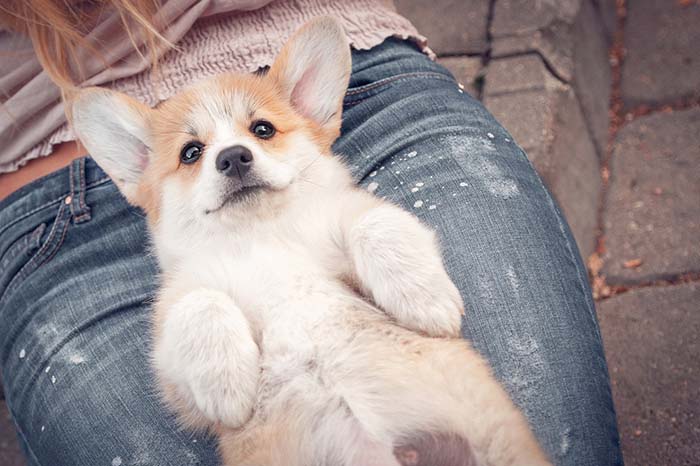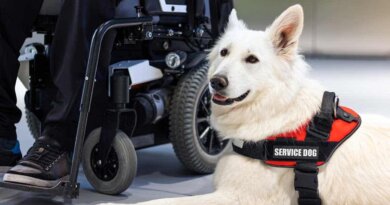11 Popular Mild-Tempered and Calm Small Dogs – Top Dog Tips
You have decided to add another member to your family. This one will be four-legged and hairy. Trying to choose a breed can be quite a task, but for whatever reason, you’re looking for calm small dogs.
Good – there are many small and toy dog breeds out there that you can save by adopting and that will enhance your life in return.
All dogs are different, and picking the one that will fit your lifestyle is crucial.
You’ve made the right first step by narrowing down your adoption criteria and choosing a specific type, such as calm small dogs because you’re aware that bringing home an animal will change the way you function in everyday life from that point on.
Many lazy couch potato breeds would work great for pet owners who prefer to cuddle with their pooch in front of a TV or to read a book instead of hiking every day.
But in this list, we’re going to take a look at calm small dogs specifically. Before we get to that, there are a few things you need to confirm for yourself to be certain.
Is a Calm Small Dog Right for You?
Likely, you’ve already considered this, but if you haven’t, remember to factor in the following to know whether any of the calm small dogs listed below are right for you or if a medium moderately active dog would be a better fit:
- What kind of lifestyle do you have? Are you an avid outdoor type, or do you prefer to read books curled up on the couch in your spare time?
- Do you stay indoors at home most of the time, or do you prefer to travel and go out as often as you have the time to?
- Do you live in a tiny apartment or a large house with a backyard?
- How much time can you spend with your companion daily, and how often can you play and exercise with your pooch?
- Do you have children? Are there any other family members, significant others, or roommates living with you?
The above factors are self-explanatory, but there is a lot to think about when deciding to adopt a dog. It would be best to make sure everyone in the family agrees to add a new face to the house.
I would also advise you to browse prices on pet health insurance, veterinary bills, and dog supplies: leashes, collars, harnesses, a bed or crate, and food.
Compare everything for small dogs and medium or large dogs so that you have a good idea of how much your future pet will cost you.
When you’re positive that calm small dogs are your favorite category, and you’re ready to adopt a mild-tempered dog of little size, the below list of 11 best calm small dogs will give you a good idea of each dog’s pros and cons and what to expect.
ALSO READ: How Not to Get Scammed Adopting a Puppy
11 Calm Small Dogs that are Mild Tempered
1 The Pug
Pugs are the entertainers of the doggy world. They are actually full of energy despite their lazy look. Pugs enjoy hamming it up for their owners.
They are calm and make a good companion dog for an apartment or house. Pugs weigh anywhere from 15 to 20 pounds. If it is a couch potato to snuggle with, the Pug is a perfect choice.
Pros
- Energetic sometimes but can happily be a couch potato.
- They do shed their short hair, so brushing is needed.
- Small size for an apartment or house
Cons
- Theirs pushed in the face can lead to breathing problems
- Round protruding eyes are prone to ulcers and infection
- Genetic heart conditions
- They can easily become obese
2 Cavalier King Charles Spaniel
This beautiful dog was bred to be a gentle companion to everyone. Their favorite thing is to be with their people.
Cavalier King Charles is about 15 to 20 pounds. He is happy in a country home or a small apartment. He is not much of a barker either. This makes him even more sought after as a companion.
Pros
- They have a loving temperament.
- They are polite with everyone they meet, no matter the species.
- Beautiful soft coat
Cons
- When left alone too long, will chew and bark until you return. Separation anxiety is high in this breed.
- If they are not socialized properly when young, they can be timid and fearful.
- They love to chase things. He needs a fenced-in yard or a long leash to get his exercise. If off the lead, he may take off on you in pursuit of whatever caught his attention!
- They shed a lot. Regular grooming is needed.
- They can have potentially serious illnesses that are genetic. They can shorten their life expectancy if they get them.
3 Corgi
The Corgi is one of the popular calm small dogs, but they’re actually working dogs and are used on farms to herd animals. They were bred for this, and they will still try to herd you but won’t hurt you or the kids. It is quite a sight to see them herding a bunch of children.
The Corgi makes a great companion for you or as a family dog. Weighing in at 20-31 pounds, they are a nice size. While they are mild-tempered, since Corgi is a working dog, he is happiest when he has a job to do.
Pros
- The Corgi is an intelligent dog and learns quickly.
- They love to please their human.
- They are great for agility competitions, obedience, and rallies.
- They love being outside, and hiking is something they really enjoy
- They are protective of their families.
Cons
- Corgis are a herding breed, and they will herd humans as well, expect to get your feet nipped at when playing rough.
- They need lots of socialization when they are young, or they could be fearful of strangers.
- They need regular daily exercise to keep from becoming bored and destructive.
- It would help if you watched their weight; a fat corgi is prone to back issues.
- Many illnesses could become an issue through heredity.
4 Boston Terrier
The Boston Terrier is a lovely calm small dog with a great temperament. Weighing in anywhere from 10 to 20 pounds, this breed is gentle and enjoys an apartment or house as his home. He also is good with respectful children.
They are quite striking in their ”tuxedo” of black and white. The Boston is mild-tempered but active and often would prefer sitting with his human in peace.
Pros
- Their short goat doesn’t shed a lot.
- They aren’t barkers
- They will want to do anything you are up to since you are their world.
- Getting him to sleep in is no problem; he is happy to oblige!
- Good apartment size dog
Cons
- Boston Terriers can be stubborn and hard to housebreak
- They can be stubborn if not trained right; they need to know who is boss early on.
- They can have many health issues from their short face. Lots of breathing issues.
- They can not tolerate heat because of their faces and should have an air-conditioned place.
5 Yorkshire Terrier
The Yorkshire Terrier is a tiny bundle of energy and probably the most popular of the calm small dogs on this list.
They enjoy walks, car rides, and playtime. This little one is at home in an apartment or the country.
Most Yorkies weigh in at 5 to 12 pounds, so they are totally portable and can be carried in your doggy purse.
They enjoy playing with toys and are more than happy to enjoy a long game of fetch, but can be couch potatoes as well.
Pros
- Yorkies are tiny and are easy to take almost anywhere.
- They are affectionate
- They do not shed much.
- They don’t require a lot of exercise.
- Yorkies don’t have many inherited health problems.
Cons
- Yorkies require lots of brushing to keep that long coat looking good.
- They can be difficult to housebreak
- They aren’t a good choice if you travel and leave them alone a lot, they will become destructive.
- They can become snappy and act scared if they are not socialized properly.
- He can easily break a bone in a fall off of furniture or the bed.
- They don’t like cold temperatures.
- Never play rough with a Yorkie; he could be damaged internally
6 Miniature Schnauzer
The smallest of the three sizes of Schnauzer is the popular one out of the Giant, Standard, and Mini.
He is intelligent and easy to train. They also love getting into things that aren’t theirs, especially if they get bored.
He also likes to stretch his legs on long walks. Sized just right at 12 to 20 pounds, he enjoys apartments as well as home life.
Pros
- They are intelligent and learn quickly.
- Loyal to their family and eager to please
- Nice for a watchdog, NOT a guard dog.
- They enjoy activities like obedience and agility.
- They adapt to their surroundings.
Cons
- They do have a prey drive, so no pocket pets in the home.
- Their coat needs special grooming to keep it looking sharp.
- They can be barkers if not trained early
7 Havanese
The Havanese is in the toy breed section, making it a tiny dog. These silky coated beauties are almost non-shedding. Someone with allergies shouldn’t be bothered by them.
Weighing in at 9 to 16 pounds, they enjoy cuddling as much as chasing the kids in the yard; they make great pets for families with children.
Havanese is also the perfect size for any home and any owner looking for very calm small dogs that love to cuddle watching TV.
Pros
- Amusing and adaptable to any house or apartment
- Sturdily built for a small dog.
- Child friendly
- Not a barker
- Enjoys walking or playing
- Easy to house train
Cons
- Their long coat needs frequent grooming to keep it clean and healthy.
- They can get hip dysplasia, juvenile cataracts, luxating patellas (bad knees), and cherry eye. All these are hereditary conditions and crop up from time to time.
8 Shetland Sheepdog
The Shetland Sheepdog, or “sheltie,” is a long-haired beauty.
Weighing in at 14 to 27 pounds, they are a good size for an active family. They are more at home with a yard or farm to run on since they are very active.
Trained as a herding dog, she is intelligent and enjoys agility classes.
Pros
- Smart, loyal, and very eager to please
- Excellent pets for a family
- They enjoy performing in agility and obedience competition.
- They will be first in line to go out and do something with you!
Cons
- A double coat that requires lots of grooming
- A lot of shedding
- They are prone to separation anxiety when left alone too long
- They often bark, so not a good choice for an apartment dweller
- Unless children are respectful, keep them away from a Sheltie
9 Miniature Poodle
The miniature poodle is the mid-size poodle. You can find them in the toy, miniature, and standard sizes. This lovely guy is at home anywhere you are. He enjoys walks, car rides, and playing as much as lying on the couch doing nothing. He is also one of the hypoallergenic breeds that almost don’t shed. But the coat does require care. He is great with adults as well as children.
Pros
- Highly intelligent
- Great temperament
- Excellent with children
- He loves to please his owner.
Cons
- They need frequent grooming.
- They need a couple of walks a day or a yard (fenced) to run in.
- Miniature poodles have many genetic problems. Any of them may show up: Progressive retinal atrophy, epilepsy, thyroid issues, to name a few.
10 Lhasa Apso
Lhasas weigh in at 12 to 18 pounds, making them another ideal apartment dog and one of the best calm small dogs out there.
They can be active or couch potatoes all day; it all depends on your doing.
They have a long coat, so they are not maintenance-free. Lhasas are good with older children from about 10 and up, and they may quickly pick a favorite human.
Pros
- Small, but not a shrinking violet
- Too smart
- A mannerly house dog, when trained right
- A great watchdog because of loyalty to family
- No need for lots of exercises, good apartment dog
- Not a barker
Cons
- Very stubborn unless you start training early
- Can be too cautious with strangers if not socialized
- Lots of brushing and combing to keep his beautiful coat or a haircut every few weeks.
- They will snap at you if they think you are harsh when correcting them.
- They can be food and toy aggressive even with people.
- If you have a small child in the house, this dog isn’t for you. They are best with kids over 10
11 Mixed Breed
There are so many “pure” breeds that you can adopt from reputable dog breeders, but there are also calm small dogs of mixed breed waiting to go home. Some of the crosses are lovely and have outstanding personalities.
Check your local shelters for a new friend if you’re still unsure which of the above-mentioned best calm small dogs are the right fit. You will get a friend who has had shots, has been spayed or neutered, and evaluated to know what their personality is like.
If you go to a shelter, you and your family will have a meet and greet to see if you will be compatible. If all goes well, you will pay your friend’s adoption fee and take him home.
Pros
- Most of the time, the dogs are young adults. Letting you see more of what they are like.
- They have cleared a physical, have been neutered or spayed and had their shots.
- The puppy habits are behind them.
- You can see more than one dig when you are considering your next best friend.
- You make room for another life to be saved.
Cons
- They have a limited history unless they are an owner turn-in
- They should be somewhat housebroken, but in a strange place, you will have some re-training to do
- Most shelter dogs are insecure when you first bring them home. They need time to adjust to the new environment. It can take two weeks to get them used to a new routine and feel safe, so if you can’t do this, don’t get a shelter dog.
READ NEXT: Top 10 Best Dog Foods for Small Dogs
Video of Top 10 Calm Small Dogs















